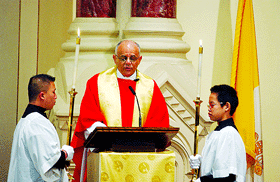By Divya Watal
Father Raymond Nobiletti lends true meaning to the word “catholic.”
Nobiletti, 62, may be of Sicilian-American stock, but that hasn’t stopped him from pastoring an all-Chinese congregation for the last 14 years in Chinatown. He speaks Cantonese fluently and is currently studying Mandarin, although, he concedes woefully, he doesn’t speak Italian.
“Catholic means universal and inclusive,” says Nobiletti, a dapper man with a warm smile and affable manner. “I won’t say this is a Chinese church – we call it ‘The Church of Immigrants.’ ”
Nobiletti leads the Church of the Transfiguration on 29 Mott St. ensconced deep within Chinatown. The Georgian-style, gray-stone church with a conspicuous green bell tower is a designated New York City landmark, and it stands silently and elegantly amid the colorful buzz of Chinese shops and restaurants.
“I believe we have a spirit of being open,” he says, “like this pope.” Nobiletti points to a picture of Pope John Paul II at the entrance of the church. A sign below the picture announces a special commemorative mass in his honor. This mass, like all other weekly masses, took place a few days later in both Chinese and English.
“To include rather than exclude – that’s what he [Pope John Paul] wanted,” Nobiletti continues.
He met the pope on several occasions, but the one meeting he cherishes took place in the Vatican over a decade ago. After celebrating mass with the pope in his private chapel – “an honor in itself” – Nobiletti spoke to him about his favorite topic: China.
“He asked a lot of questions – he was anxious to find out who you were,” Nobiletti says in a dream-like voice. He seems enthralled by the memory of the visit. “He had never been to China – it was an unfulfilled goal.”
Nobiletti himself lived for 15 years in Hong Kong, studying Chinese at the University of Hong Kong. He was sent there by the Maryknoll Catholic Foreign Mission Society of America after being ordained as a priest in 1969. He returned to the United States in 1984 and assumed various administrative positions within the Society.
On April Fool’s Day in 1991, he joined the Church of the Transfiguration.
“Chinatown was quite different back then,” Nobiletti recalls. “There were gang problems, social problems, people shooting each other in the streets … no one wanted to come down here.”
After Mayor Giuliani swept the city clean, the situation in his parish improved, he says, but the church constantly receives new immigrants who bring with them complex problems of assimilation. Chinatown’s current wave of immigrants, for instance, come from the Fujian province of China.
“Some [Chinese immigrants] are illegal,” he explains. “They need medical help, legal help – they trust the church. They’re industrious and loyal, and Catholic-wise, they’re very devout people.”
Although he could not say what percentage of Chinatown’s residents are Catholic, Nobiletti adds that 32 young adults were baptized by the church this past year.
Transfiguration’s congregation on a typical Sunday comprises about 800 to 900 people, Nobiletti estimates, although he adds that “the crowd is quite fluid.” Not all come from Chinatown – some come from Queens, Brooklyn and even New Jersey. Many families visit Chinatown on weekends for the food, lively atmosphere and bargain shopping, and they often stop by for mass, he says.
However, the church hasn’t fully recovered from the events of Sept. 11, 2001, although “things are picking up,” Nobiletti says.
“It was a horror here,” he says. “The place started to close down after 9/11.” The streets of Chinatown were blocked, there were no working phones for four months, there was a pervasive stench, and people even needed passports to move around the neighborhood, he recalls with discomfort.
But none of this drove him away from the parish.
“I couldn’t leave after that,” he says. “In fact, I had even more reason to stay.”
Nobiletti runs a small school, attached to the church, for about 270 children in grades 1 through 8. Transfiguration also runs a kindergarten located in Confucius Plaza for about 125 children. In addition, every weekend about 900 children come to the church to study Chinese. He is helped by two religious sisters, one Jesuit priest in residence, about 30 teachers, an administrative assistant and an army of volunteers, he says.
“There are so many churches in Lower Manhattan,” he says. “Sicilian, Genoan, Irish, et cetera – they’re all exclusive.
“There are too many churches and not enough parishioners,” he says, breaking into warm laughter.
So, instead of creating a hundred different houses of worship for a hundred different groups of people, having one inclusive, “Catholic” church not only saves space, but also promotes unity, according to Nobiletti’s logic.
“I like it here,” he says of his all-encompassing Church of Immigrants, “and I’m staying here.”
WWW Downtown Express

































